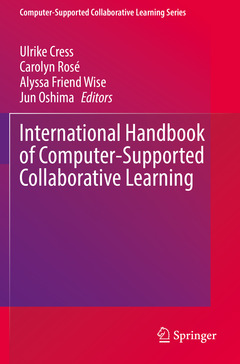International Handbook of Computer-Supported Collaborative Learning, 1st ed. 2021 Computer-Supported Collaborative Learning Series, Vol. 19
Coordonnateurs : Cress Ulrike, Rosé Carolyn, Wise Alyssa Friend, Oshima Jun

CSCL has in the past 15 years (and often in conjunction with Springer) grown into a thriving and active community. Yet, lacking is a comprehensive CSCL handbook that displays the range of research being done in this area. This handbook will provide an overview of the diverse aspects of the field, allowing newcomers to develop a sense of the entirety of CSCL research and for existing community members to become more deeply aware of work outside their direct area. The handbook will also serve as a ready reference for foundational concepts, methods, and approaches in the field. The chapters are written in such a way that each of them can be used in a stand-alone fashion while also serving as introductory readings in relevant study courses or in teacher education. While some CSCL-relevant topics are addressed in the International Handbook of the Learning Sciences and the International Handbook of Collaborative Learning, these books do not aim to present an integrated and comprehensive view of CSCL. The International Handbook of Computer- Supported Collaborative Learning covers all relevant topics in CSCL, particularly recent developments in the field, such as the rise of computational approaches and learning analytics.
Ulrike Cress is director of the Leibniz-Institut für Wissensmedien (Knowledge Media Research Center) and professor at the University of Tübingen. She studied psychology in Tuebingen, Germany, did a dissertation about self-regulated learning and got a venia legendi for psychology with a work on the information-exchange dilemma. With her lab "knowledge construction" she is doing research on learning with digital media in formal settings as well as in informal settings. She is especially interested in mass collaboration, and much of her research aims to further develop the Co-Evolution Model of Individual Learning and Collaborative Knowledge Building, which she presented in 2008. She published more than 150 articles in peer-reviewed journals, and about 100 book chapters and contributions to conference proceedings. Since 2015 she is one of the four executive editors of the International Journal of Computer-supported Collaborative Learning.
Carolyn Rosé is a professor in the School of Computer Science at Carnegie Mellon University. Her research program is focused on better understanding the social and pragmatic nature of conversation and using this understanding to build computational systems that can improve the efficacy of conversation between people, and between people and computers. She grounds her research in the fields of language technologies and human-computer interaction and works closely with the Language Technologies Institute and the Human-Computer Interaction Institute, as well as serving as the director if the TELEDIA lab. Her group’s highly interdisciplinary work, published in over 250 peer reviewed publications, is represented in the top venues in 5 fields: namely, Language Technologies, Learning Sciences, Cognitive Science, Educational Technology, and Human-Computer Interaction, with awards or award nominations in 3 of these fields.
Alyssa Wise is Associate Professor of Learning Sciences and Educ
Provides a comprehensive overview of the diverse aspects of the field of computer-supported collaborative learning useful for newcomers or experts
Serves as a ready reference for foundational concepts, methods, and approaches in the field
Integrates myriad research perspectives, including but not limited to learning sciences, education, computer science, computational linguistics, psychology, and sociology
Speaks to a wide, growing, and international community of CSCL researchers
Date de parution : 10-2022
Ouvrage de 680 p.
15.5x23.5 cm
Date de parution : 10-2021
Ouvrage de 680 p.
15.5x23.5 cm
Mots-clés :
Foundations of computer-supported collaborative learning (CSCL); Contexts of computer-supported collaborative learning (CSCL); Methods of computer-supported collaborative learning (CSCL); Outcomes of computer-supported collaborative learning (CSCL); Group formation; Dialogism; Knowledge construction; Knowledge building; Object-oriented collaboration; Group cognition; Socially-shared regulation; Design of hard and soft technologies; Technology effects and affordances; Interactive and mobile surfaces; Games and virtual worlds; Immersive environments; Robots and agents; Learning analytics; Qualitative & quantitative approaches; Multivocality approach



